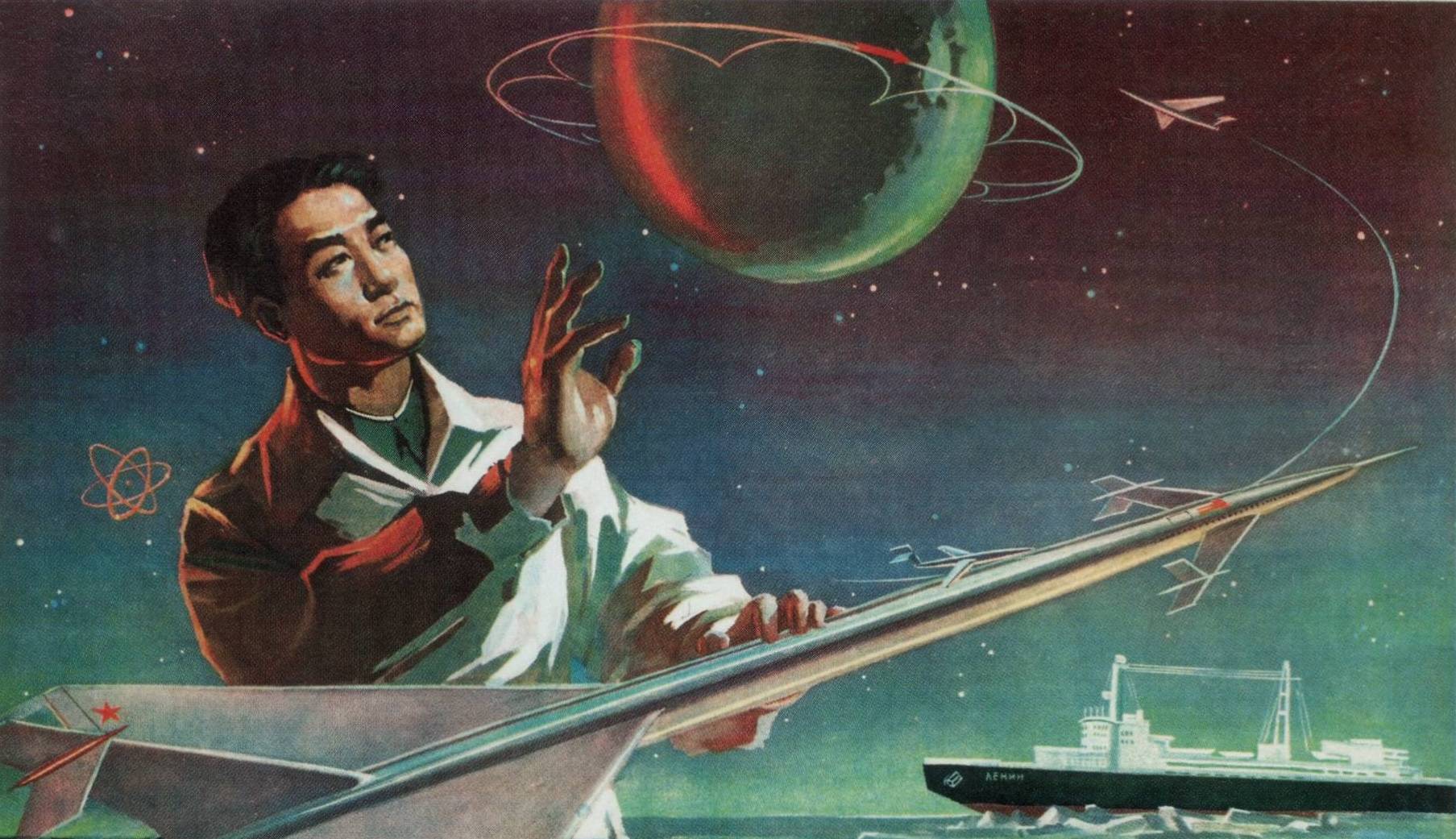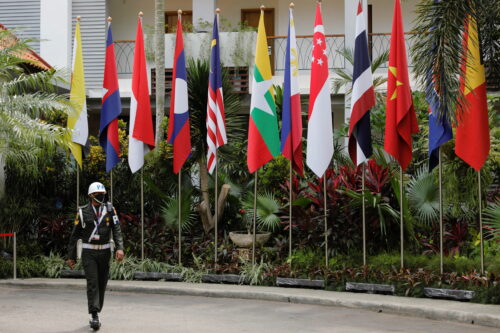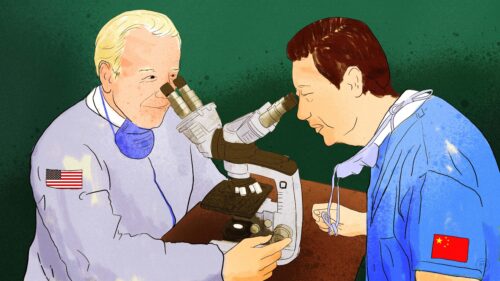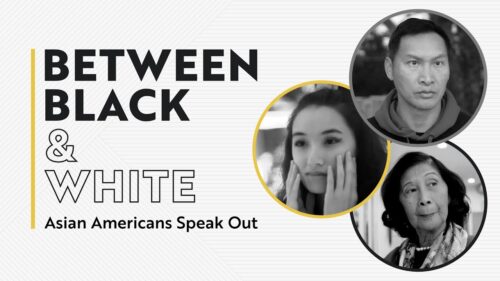My science has no nationality

For Chinese scientists who immigrated to the U.S., where do their hearts and bodies belong? In their home country, where an authoritarian government is increasing its hold on society, aided by technology for surveillance and censorship? Or in a country whose president actively rejects them, where they are painted as spies?

“U…S…A!”
The three-letter acronym was the only thing I understood from the lyric sheet, punctuating the closing line of the song. At age nine, I had just arrived in the U.S. with my mother, where my father, an engineering professor from China, was working as a visiting scientist at a large public university on the west coast. When the class stood up to sing, I tried to perform along, until the final three syllables. I pressed my lips tight as my fourth-grade classmates belted out, “U…S…A!”
Back in China, I had stood for hundreds of mandatory flag-raising ceremonies at school, saluting the five-starred banner and singing the national anthem. But never before had I felt more Chinese than the moment my nine-year-old self refused to say the name of the country I was living in but did not identify with.
“Piāo (飘)”, or floating in the wind, was how my mother described her feeling over our nine-month stay in the U.S. When it became known that we were moving back to China, Chinese friends of my parents frequented our tiny apartment with one objective: to convince us to stay. Despite years in the U.S., they too felt the persistent sense of rootlessness. Some gave up promising careers in China for menial jobs. Many accepted the reality of the bamboo ceiling. But all of the sacrifices were worth it, they said, because their children would grow up American.
“If you go back to China now, in 10, 15 years, your daughter will be taking the same path, facing the same obstacles, to come to the U.S. and try to stay.” This line took special resonance in my young mind, where a decade was longer than a lifetime. I had learned basic English, and made friends at school. Just as I was beginning to imagine a future in this strange land, it was time to leave. I cried myself to sleep every night during our final weeks in the U.S. When our transpacific flight landed in Shanghai in the late summer of 1999, I felt I had just woken up from an exotic dream, with a part of me forever left on the other side of the ocean.
I returned to the U.S. for graduate school in 2009, nearly 10 years to the date of my last departure. The place whose name I once refused to sing was now where I would lead my life and develop my career. I wanted to study physics, and to live in a free country. I had convinced myself of the promise of America, where the feeling of national belonging can be a matter of choice.
In my 10th year living and working in the U.S. as a particle physicist, such promise appears further away. As the Chinese government tightens its techno-authoritarian grip, the U.S. is becoming increasingly hostile to immigrants, and views scientists of Chinese origin with heightened suspicion. For Chinese scientists who crossed oceans, where do our hearts and bodies belong? In the shifting tide of geopolitics, who should we work for, and who might claim ownership of our minds?

Growing up in China in the 1990s, we learned in class of the country’s pioneers in modern science, the selfless heroes who gave up lucrative positions in the West and devoted themselves to an impoverished homeland ravaged by war and political turmoil. Their figures cast in bronze statues, their names engraved on stone plaques, the stories of their sacrifice were those of a bygone era.
The active examples of China’s scientific prowess, on the other hand, were all seemingly found outside of China. Special reports ran on state media whenever a scientist of Chinese descent was awarded the Nobel Prize. On countless summer nights at the university campus I grew up on, my mother would take me for evening walks, stopping by bulletin boards highlighting distinguished alumni. Lifting my heels, I looked through glass casings at their names and faces, each accompanied by a title: professor or senior staff scientist at a prestigious U.S. or European institution. During a middle school science camp, our counselor introduced the guest speaker, a prominent Chinese astrophysicist, with only four words: “Eight years in America!” We all gasped with excitement and admiration.
For a Chinese scientist whose career started at a time when the country was still underdeveloped, working abroad meant better equipment, more resources, and reprieve from cumbersome bureaucracy and an insular academy, however temporary. As my parents’ friends emphasized, it also meant opportunities for the next generation. The university my family worked at is located in a backwater province. Every year since elementary school, there would be a friend or two who moved away when their parents took a job in the national capital, a coastal metropolis, or a foreign country. In my final year of middle school, a classmate told me that if he did not do well enough in the high school entrance exam, his father would try to find a position in the U.S. The boy’s score ended up a few points shy of the admission requirement for the best high school in our city. That summer, his father gave up his professorship for a research associate position in the U.S.
As I clawed my way through its fiercely competitive education system, an economic transformation was taking place in China. Booming alongside the commercial landscape was the field of science, boosted by generous state funding and new hiring initiatives. Seemingly overnight, the journey across the oceans was no longer a one-way flight. For overseas Chinese scientists of an older generation, whose children have grown up into lives of their own, the homeland beckons with tantalizing opportunities to start new labs — and calls to them in the form of filial duty to take care of aging parents. For young Chinese scientists who studied abroad, starting a career and raising a family in China can appear just as desirable, if not more so, compared with the harrowing path of emigration.
In my junior year at college, I joined the lab of the school’s latest prized hire. The esteemed physicist returned to his alma mater after years in the U.S. and Europe. From the proud pronouncement of other professors in the group, I learned the name of China’s new flagship overseas recruitment program: “Thousand Talents.”
Days before my graduation, the professor, who supervised my senior thesis, called me into his office. “I will not give you academic advice, because the University of Chicago will take care of that.” He mentioned the institution where I would be pursuing my Ph.D. “Instead I want to give you three pieces of life advice before you leave for the U.S.: Be healthy. Stay safe. And respect the rule of law.”
“I see in your future a faculty position at an American university,” he said. I chuckled with embarrassment. My professor had placed his faith in my academic career before I knew what I wanted for myself.

When I left China a decade ago, I had no illusions about its authoritarian government. Nevertheless, new wealth, mobility, and social media platforms harbored the potential for political reform. Many among the scholarly elite, from public intellectuals to human rights lawyers, tried to work within the system toward a freer China. One might argue that absolute control has always been in the DNA of the Chinese Communist Party, but few could have predicted the political regression that’s taken place over the past few years. Legal advocates have been thrown in jail. Dissenting voices are silenced. The Party has increased its hold on all walks of Chinese society, aided by new technology for surveillance and censorship.
“Advanced technology is a sharp weapon of the modern state,” declared Xi Jinping in 2013, during one of his first major speeches as China’s new supreme leader. Chinese scientists who see their work as a refuge from government affairs are nevertheless pushed to the frontlines of great power politics, and depending on their field of research, contribute directly or become complicit in their own oppression.
China’s march toward digital Leninism is happening at a time of rising ethnic fervor and democratic retrenchment across the globe. Alarmed by the Chinese government’s abusive practices, and aggravated by xenophobic and racist agendas from members of the Trump administration, the U.S. government has placed heightened scrutiny on scientists of Chinese origin, shortening student visas and restricting access to certain research facilities. Government agencies such as the Departments of Defense have pursued policies that would limit funding to U.S. universities that have ties with foreign recruitment programs, in particular Thousand Talents. The recent abrupt dismissal of multiple Chinese faculty at MD Anderson and Emory University, regardless of individual justification, strikes fear among the Chinese American community with the appearance of racial profiling and the potential rekindling of “Yellow Peril.”
Some of the targeted measures are necessary to punish wrongful behavior and prevent future violations. The Chinese government sees science as a tool for national greatness, and claims to represent an entire people regardless of their citizenship or country of residency. However, when the U.S. government paints every scientist of Chinese ethnicity as a de facto agent of the Chinese state, guilty until proven innocent, such racist paranoia inadvertently gives credence to the Chinese government’s own authoritarian fantasy, and aids the latter in its talent recruitment and political influence beyond its borders.
“Do they fully support freedom, democracy, and the rule of law?” Many social media users in the U.S. carelessly throw around these demands as a prerequisite for admitting Chinese nationals to study in the U.S. Never mind the murky definition of the terms and infeasibility of implementation, an ideological purity test is by construct authoritarian. The Chinese government often pressures its citizens to pay lip service to the Party’s glory, but a citizenry’s lack of dissent does not equate to endorsement.
On the proxy battleground for technological might, scientists are spoken of as strategic assets, instead of human beings with desires and agency. Each time I see a headline or read an article on the tech race between my birth country and my adopted home, I feel the weight of a border on my back. How does a state take possession of scientific progress? Can a government lay claim to science produced by its citizens, within its borders, or through its funding? Is technological advancement an inherent force for good?
Every time there is a new report on possible military applications for emerging technology, I wonder how much thought has been put into the human cost of their deployment. Such analysis is often presented as competition between the world’s two leading powers. I understand the need for these projections, and respect the people who produce them, but each time I try to read their findings, all I hear is a voice of dread: “This is how I will die. This is how my loved ones will die.” What is the point of speculating who might emerge victorious in an imaginary war, when the horror of such a conflict is beyond imagination?
The U.S. beat Nazi Germany in the race to the Bomb, only to remain the only country that has used nuclear weapons in warfare — at the cost of more than a hundred thousand Japanese lives. In 1946, Robert Oppenheimer, the scientific leader of the Manhattan Project, served as chief advisor to a government study on nuclear arms control. Its outcome, known as the Acheson-Lilienthal Report, argued that true security does not come with technological superiority held as state secrets, but in a radically open world where weapons design is public knowledge, reachable by all but attempted by none. The groundbreaking proposal was quickly sidelined amidst the Cold War. It is a sad indictment of humanity that our fragile survival has since been sustained by the prospect of mutually assured destruction. Have we not invented enough means to kill, while existential threats like climate change remain unresolved?

One evening during a recent academic trip to California, I ran into a familiar figure in a hotel lobby. We stared at each other for a long time before both of us pronounced our own names. It had been more than nine years since our last meeting in his office, even as his parting words have remained a source of strength and encouragement.
It was already late, but there was a lot of catching up to do. I updated my undergraduate mentor on the progress of my career, and he spoke of the latest developments at our alma mater, where he still works. We discussed the future of particle physics and the state of world affairs. As the night progressed, our conversation shifted to the ethical quandary of dual-use technology, and China’s authoritarian politics.
I wanted to ask, with the knowledge of hindsight, whether he would have made the same decision to return to China and subject himself to an increasingly repressive government. But the closest I got to asking was making a self-evident statement: “But you still went back.” I felt like a petulant child, trying to extract a moral concession where none could be given. For someone of my professor’s generation who came of age during the Cultural Revolution and witnessed the hope for reform crushed by tanks outside Tiananmen Square, grasping the political reality of China required no reminder from a youngster. Even for those whose profession offered the privilege of movement, is living in a democracy more righteous than staying in an autocracy? Is attachment to one’s land of birth any less a human desire than the longing for freedom?
My professor and I were both leaving the next morning, headed in opposite directions, him back to China. We promised to stay in touch, but he did not ask when I might visit him in China. I had just moved places before that trip, and the packing process revealed my old college yearbook, the first page of which I took a photo of.
I showed the picture to my professor.
“I’m glad to see you still kept my words to you when you left for the U.S,” he smiled, and we bade goodbye.
On the front page of the blue-covered yearbook emblazoned with my college logo, there is a print of the verse “Second Farewell to Cambridge (再别康桥)” by the 20th-century Chinese poet Xu Zhimo 徐志摩. Next to the classic lines on encounter and departure reads this handwritten message by my professor:
“The pursuit of science and exploration of nature will bring you eternal serenity and joy. May you one day grow into a tree that reaches for the skies.”
My profession studies the origin and evolution of the universe. I have crossed oceans and political systems to plant my science at the creation of our cosmos. Under the same skies, in whose land might the wandering roots of a Chinese scientist find home?

Yangyang Cheng and the Science and China Column will return on the final Wednesday of every month. Last month:
Protesting in the name of science: The legacy of China’s May Fourth Movement





